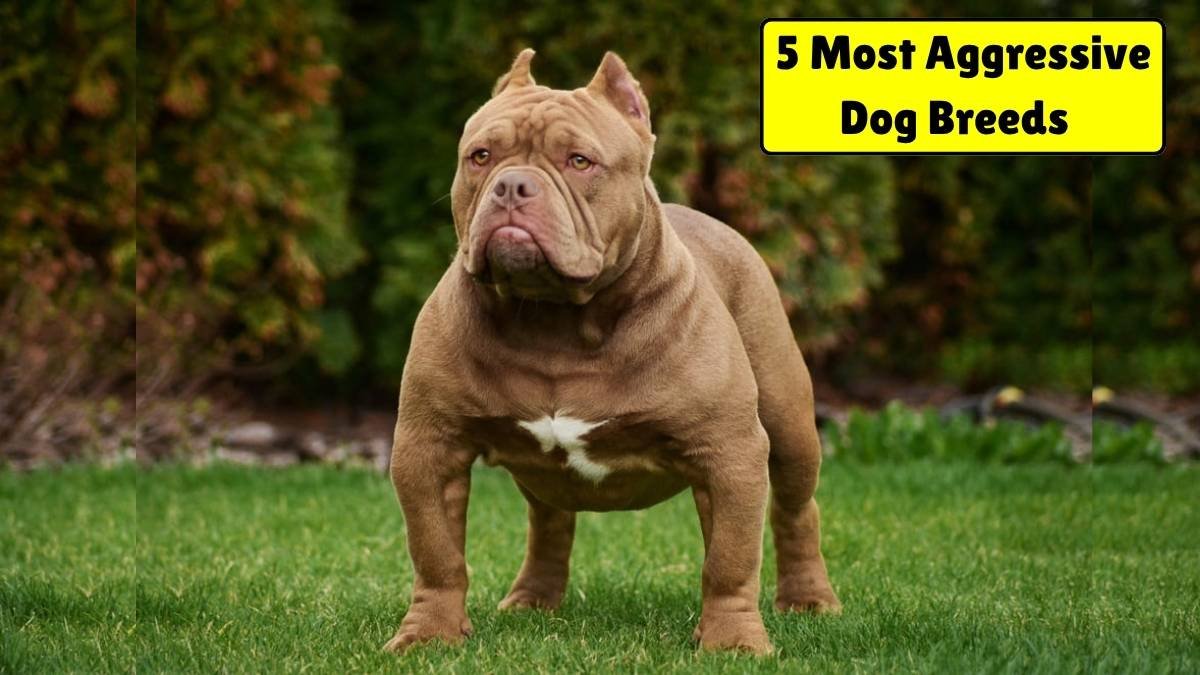When it comes to choosing a dog, temperament plays a crucial role in how well the dog will fit into a particular household. While many dogs are friendly, playful, and loving, others may display more aggressive traits. However, it’s important to note that aggression is not solely determined by breed. Factors like socialization, training, and environment play a huge role in shaping a dog’s behavior. Still, certain breeds have a reputation for being more aggressive due to their instincts, protective nature, or energy levels.
In this post, we will explore the top five most aggressive dog breeds, according to expert opinions. It’s essential to understand that aggression in dogs can manifest in various forms, including territorial behavior, fear, and protectiveness. Let’s dive into the breeds most often linked to aggressive tendencies.
1. American Pit Bull Terrier
The American Pit Bull Terrier is one of the most misunderstood breeds. Often associated with aggression due to media coverage of attacks, this breed’s temperament varies widely depending on the individual dog’s upbringing. However, experts agree that Pit Bulls can display aggressive behavior if they haven’t been properly trained and socialized.
Pit Bulls were originally bred for bull-baiting and later as working dogs for farm protection. Their high energy and protective instincts make them naturally suspicious of strangers. While many Pit Bulls are gentle, loving family pets when raised in a positive environment, others may show signs of aggression towards other animals or humans, especially if they haven’t been well-socialized.
Because of their strength and determination, if a Pit Bull does become aggressive, the results can be severe. However, with proper training, exercise, and supervision, many Pit Bulls are affectionate and loyal companions.
2. Rottweiler
The Rottweiler is another breed often listed as one of the most aggressive dog breeds. Historically, Rottweilers were bred to guard livestock and pull carts for butchers. Their protective instincts are still prevalent today. They are fiercely loyal to their families and can be extremely territorial, making them excellent guard dogs.
While Rottweilers are known to be calm and gentle with their families, they can become aggressive if they feel threatened or if they perceive a danger to their loved ones. Aggression may also arise if a Rottweiler is not properly trained or socialized from a young age. Without proper discipline, Rottweilers may become territorial or dominant, especially towards other dogs or unfamiliar people.
For owners who can provide consistent training, early socialization, and firm leadership, Rottweilers can be affectionate, protective, and reliable companions. However, they do require an experienced handler to avoid any potential aggression problems.
3. German Shepherd
German Shepherds are well-known for their intelligence, versatility, and loyalty. They’re often used in police and military work because of their ability to follow commands, protect their handlers, and handle stressful situations. While they are not naturally aggressive, German Shepherds are protective and territorial, traits that can lead to aggressive behavior if not properly managed.
A German Shepherd may display aggression if it perceives a threat to its home or family. This breed is known for being highly protective, and if not socialized well, it can become fearful or suspicious of strangers. Proper training and socialization are critical to helping a German Shepherd differentiate between a real threat and a harmless situation.
Given their high energy levels, German Shepherds need regular exercise and mental stimulation. Without this, they may become anxious, which can contribute to aggressive tendencies. Owners who are firm yet loving will find that a German Shepherd can be a wonderful, loyal companion.
4. Doberman Pinscher
The Doberman Pinscher is often seen as a tough, intimidating dog, and while it’s true that Dobermans can be aggressive, this is largely due to their protective nature. Originally bred as guard dogs, Dobermans are alert and quick to respond to potential threats. They are highly intelligent, energetic, and loyal to their families, but their guard-dog instincts can lead to aggression if they perceive a situation as dangerous.
Much like other guard dogs, Dobermans can display territorial behaviors, especially if they’re not properly socialized or trained. They are known to be suspicious of strangers and may react aggressively to unfamiliar people or animals. However, with the right training and socialization, Dobermans can be affectionate and even-tempered pets.
A Doberman’s aggressive tendencies can be managed with consistent leadership, but it is crucial that owners be experienced in handling high-energy, protective breeds. Without proper training and socialization, Dobermans can become overprotective, which may lead to aggression.
5. Bullmastiff
The Bullmastiff is an imposing dog, often weighing over 100 pounds, and it is known for its natural guarding instincts. Originally bred to protect estates from poachers, Bullmastiffs are powerful and protective. While they are generally calm and gentle with their families, they can become aggressive if they feel their territory or loved ones are being threatened.
Bullmastiffs are typically not aggressive by nature, but they do have a strong territorial instinct. They are highly protective of their families and may react aggressively to intruders or unfamiliar animals. Socialization is vital to ensuring that Bullmastiffs remain calm around strangers and don’t develop aggressive tendencies.
Although Bullmastiffs are not usually known for being overly aggressive, they do require firm training and consistent boundaries. If they sense any weakness in their handler, they might take charge of the situation, leading to potential behavioral issues. It’s important to give Bullmastiffs proper leadership and attention to ensure they are well-adjusted and balanced dogs.
Conclusion
It’s crucial to remember that aggression in dogs is often a result of a lack of socialization, training, or improper handling, rather than an inherent trait of the breed itself. While some breeds, such as the American Pit Bull Terrier, Rottweiler, German Shepherd, Doberman Pinscher, and Bullmastiff, are more likely to display aggressive tendencies due to their protective nature or instincts, many of these dogs can make excellent companions when raised in a structured environment.
Aggression can be minimized or avoided altogether through proper socialization, early training, and consistent leadership. If you’re considering adopting one of these breeds, it’s essential to understand their needs and provide them with the right environment to thrive. Every dog, regardless of breed, deserves to be treated with respect, kindness, and a firm but fair hand when it comes to training. With the right approach, even the most naturally protective breeds can become loyal, loving family members.




